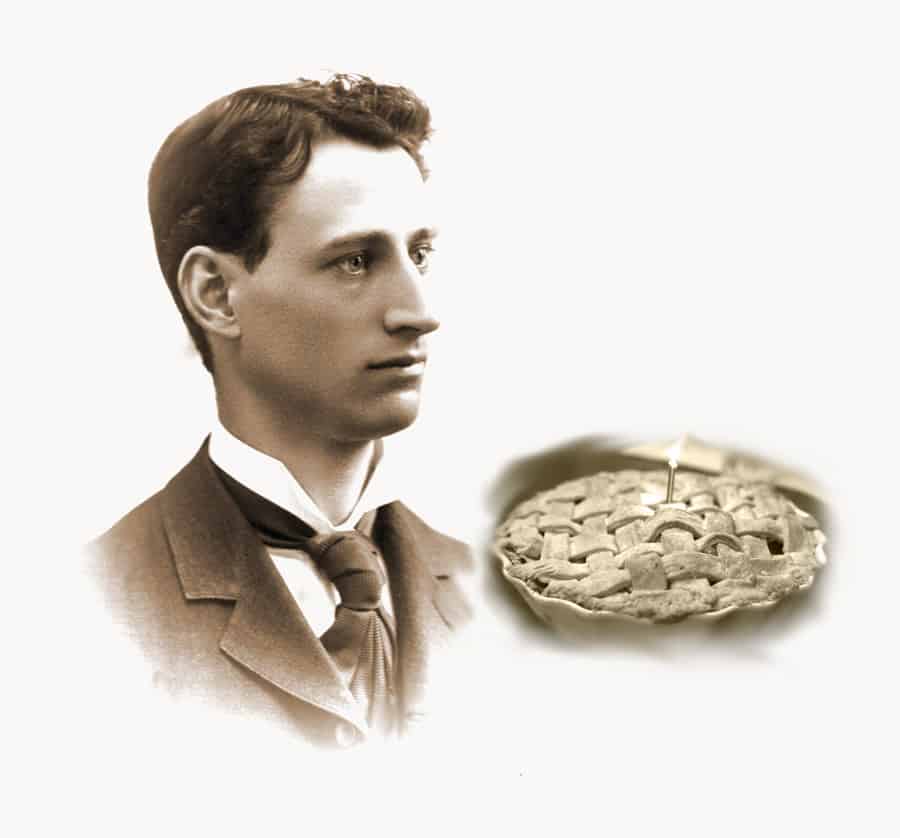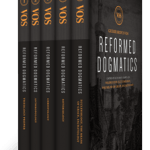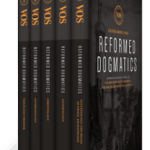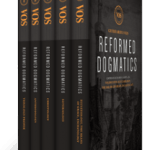
Today is March 14, and this post is airing at 9:26 a.m. (PDT), which makes it 3/14/15 9:26?also known as the first eight digits of ?. Happy Pi Day, everyone!
Pi Day also happens to be Geerhardus Vos? birthday. In case you haven?t heard yet, we?re celebrating Vos? birthday by discounting his Reformed Dogmatics to over 20% off.
So what are you waiting for? Grab yourself a piece of birthday pie, grab Reformed Dogmatics for a great price, and enjoy Pi Day!
Just for fun, here?s the 14th section from the 3rd chapter of Reformed Dogmatics: Theology Proper.
* * *
14. Give a description of the most important terms that have been used and are still being used by theologians in their doctrine of the Trinity.
- First, we have the words ousia and hypostasis (????? and ?????????). Ousia is the being of God in the abstract that is common to the three persons. Hypostasis, on the other hand, means the personal existence mode of this being, what we call person.
Both these terms originate from Greek philosophy. Ousia is Platonic, hypostasis is Stoic. The latter originally means ?self-existence? and could therefore be used by theologians for a long time to express the same as ousia. Later it took on more the sense of ?person.? But not at once. Consequently, great confusion arose because one could now hear at the same time the assertion that there was one hypostasis and that there were three hypostases in the Godhead.
- Another Greek word is physis, ?nature.? This also indicated the substance of God in distinction from the persons. However, physis and ousia are not the same. Ousia is the being of God in the abstract. Physis is inclusive of the attributes in Father, Son, and Holy Spirit, that is, those unique to the divine being. The attributes, however, are inseparably joined to the being (Greek ?????)
- Still another Greek word was pros?pon (????????). The original meaning is ?face? or ?mask.? The Latin persona, from which we get ?person,? had the same meaning. Naturally, the heretical Sabellians, who wished to know only of a revealed trinity, eagerly made use of these words in order to gain acceptance for their sentiments. The consequence of this, however, was that the orthodox avoided these words. The Greeks therefore used the above-mentioned hypostasis for ?person,? even where they had earlier used pros?pon.
- The western Latin church also found it difficult at first to find unambiguous terms. There were two Latin words, namely, substantia and subsistentia. Sometimes both were used for substance, and sometimes both for person, sometimes the one for substance and the other for person. The solution was as follows:
- The term substantia was abolished in relation to God. Substantia is associated by contrast with accidentia, ?accident,? ?chance,? and by calling God ?substance? one did not want to give the impression that in God, too, there is chance.
- This rejected word was replaced by the more precise term essentia, ?being,? ?essence,? which corresponds to the Greek ousia.
- The nature of God, as inclusive of the attributes of His being, is called natura in Latin, which agrees with the Greek physis.
- The word subsistentia remained in use in order to indicate the personal mode of existence. Thus, it means what we call person. In the same sense is suppositum, a translation of the Greek words hypostasis and hypokeimenon (???????????).
- The ancients also spoke of a perichoresis or enyparxis (???????????, ?????????); Latin: circumcessio or inexistentia mutua, ?mutual in-being.? One wished to say that the persons of the Godhead are in each other reciprocally (John 14:2; 17:21; 1 Cor 2:10?11). There is a kind of internal circulation of the Godhead, an eternal movement within the being of God.
- The persons of the Trinity are distinguished from each other by their character (character hypostatius sive personalis; Greek: ?????? ????????). This personal factor is expressed in the names Father, Son, and Holy Spirit, which make known the uniqueness of the three persons. This factor is incommunicable, that is, it belongs only to one person. Thus, it serves to distinguish the persons. With the Father, it is His begetting the Son (but not in His causing by breathing the procession of the Spirit, for He has that in common with the Son). With the Son, it is His being begotten by the Father. With the Holy Spirit, it is His being breathed out (spirated) by Father and Son.
- Regarding the relation between persons and substance, and, in particular, regarding the question how the persons are distinguished from the substance, complete unanimity does not reign among the orthodox. Two extremes must be avoided here: Sabellianism that admits only one person, who is said to have revealed himself in three forms, and tritheism that does not comprise the three persons within the unity of substance. In order to find the proper middle way, some say that the persons are distinguished from the substance modaliter, ?according to the mode,? that is, as the substance in the abstract and as the substance in a certain mode with certain ways of existence (but not realiter, formaliter, or merely ratione). Others say that the persons are distinguished from each other realiter, ?actually? (but not essentialiter or merely ratione). Mastricht says, ?If someone cannot follow this scholastic style of discourse, then let him simply believe with Scripture that the persons are distinguished as three and declare that beyond that he does not know what kind of distinction, since Scripture has not revealed these things, or that they are distinguished supernaturally, not in a natural manner.?
- Concerning the idea to be with connected the words hypostasis, subsistentia, suppositum, persona, unanimity also does not reign. Calvin admits that the word ?person? is only an aid but still does not disapprove of its use. Socinians, Remonstrants, Anabaptists, Cartesians, and also Cocceius have disputed its use. The oldest definition was: ?Person is the divine being itself distinguished by a certain independent character and by its own manner of existence.? Later further descriptions were added. The accepted definition of the older dogmaticians goes back beyond Melanchthon to Boethuis. It reads, ?Person is an independent entity, indivisible, rational, incommunicable, not sustained by another nature and not a part of something else.?
In order to arrive at clarity regarding this matter one first needs to make clear demands that a theological definition of person must satisfy. These are:
- It may not detract from the unity of the being of God. If one says, for example, ?Person is what does not exist in another nature,? that appears to exclude the persons of the Trinity. These persons surely do not exist in themselves but in the divine nature.
- It must have an element in itself that is common to divine and human personality. In Christology, specifically the divine person of Christ serves to represent the human person of the elect in the justice of God. If a point of likeness does not exist, then this could not happen.
- It must be Reformed in that it allows the human nature of the Mediator to be impersonal. If I say, ?Person is a being with self-consciousness and self-determination (free-will),? then the human nature of the Savior is included.
In order to satisfy these three conditions at the same time, one can now formulate approximately in the following manner, ?Person is an independent entity, indivisible, rational, incommunicable, not sustained by another nature but possessing in itself the principle of its operation.?
Or, one can be content with the more modest description, ?Person, with reference to the Trinity, means the divine essence in a specific mode of existence and distinguished by this specific mode of existence from that essence and the other persons.? On this point further, see Christology.
- The activities by which each of the persons of the Trinity exists distinct from each other, one calls ?internal works? (opera ad intra). They are personal activities not common to all the persons and are incommunicable. As such they are the begetting and spirating of the Father, for the Son, being begotten and spirating, for the Spirit being spirated. These works, for the reasons mentioned, are called divided works (opera divisa).
- In contrast to the ?internal works? are the ?external works? (opera ad extra). These may not be divided but belong to the whole being (Gen 1:26; John 5:17, 19).
- The external works are performed by God?s power, and power as an attribute belongs to the being.
- In the economy or management of God each person has His unique task. For example, creation is ascribed to the Father, salvation to the Son, etc. Yet here, too, the three persons in a certain sense work together, namely, the Father through the Son and the Spirit, the Son through the Father and Spirit.
- Moreover, in the economy in a narrower sense, that is, in the economy of salvation, the persons of the Trinity exist in a judicial fellowship. Nothing can take place in which each one is not involved judicially. The Father, as Judge, represents violated holiness and is wrathful. But at the same time the thought of salvation wells up in the depth of His Fatherly heart and He ordains the Son as Mediator and the Holy Spirit as the one who applies salvation. The Son accomplishes the Mediator?s work, but He does so officially for the Father?s sake, and through the Holy Spirit He applies His merits. The Holy Spirit works in the hearts of the elect, but He does so for the sake of the Father and the Son.
- This order of working points us back to the order of existence. Just because the Father is the First Person, He occupies that place in the plan of salvation and in the external works in general. Just because the Son is the Second Person, He also assumes in both respects the position He assumes. And the same is true for the Holy Spirit.






